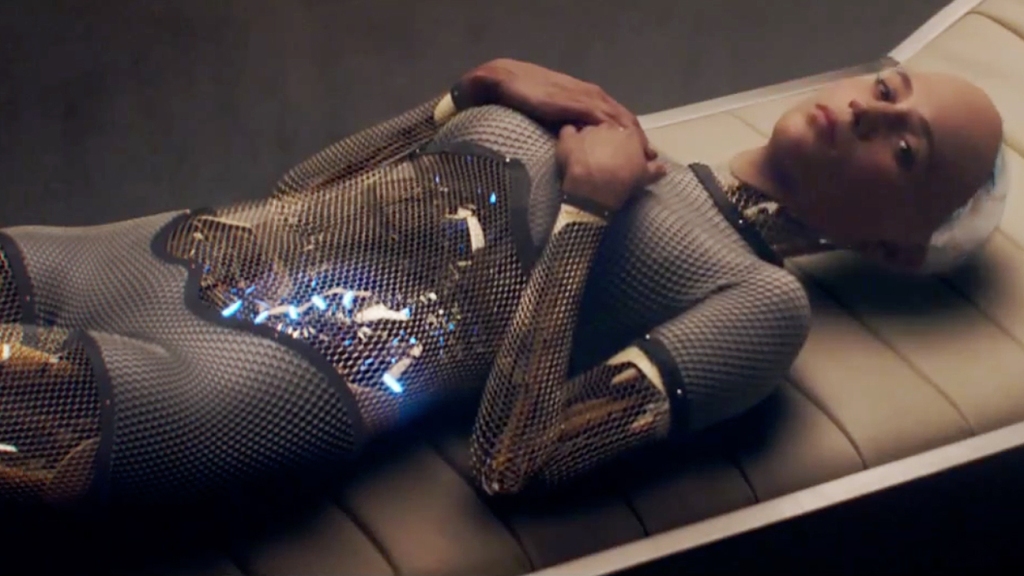Imagine if a brilliant wunderkind founded Google at the age 13. It’d make Mark Zuckerberg look like a chump. Now imagine it’s a near future, in a time where this kid is now at a nice medium age where day drinking is on the cusp of being cool, just about to fade out of style for him. He drinks more and more on a daily basis, seemingly because of that frustration with his own ego and guilt for what he’s done and failed to do. This isn’t necessarily a movie about him, so much as a film about the implication of what he has done.

“Ex Machina” follows Caleb (Domhnall Gleeson), a programmer working for this Google-clone, called Bluebook. He wins a “random lottery” within the company to spend a week on the estate of the reclusive CEO, Nathan Bateman (Oscar Isaac). It doesn’t take long before the high-tech compound intimidates both viewer and Caleb. Computerized doors chime out phrases about security clearance and prioritized access. When we do meet Nathan he’s sweatily beating on a punching bag and boasts that he is nursing a hangover. He’s gregarious and flirts with the boundary of pompous; his aggressive personality confuses and, at times, frightens. After a few minutes of idle chitchat, Nathan reveals that he is on the verge of some kind of technological breakthrough. He hardly has to do any convincing to get Caleb to sign a highly invasive nondisclosure agreement.
Here’s the deal: Caleb is going to interact with an artificial intelligence android, named Ava (Alicia Vikander), created by Nathan. The goal is to determine how advanced the AI truly is by performing what’s known as a “Turing Test.” Viewers might recognize the name of Alan Turing here, played by Benedict Cumberbatch in “The Imitation Game.” In the 1950’s, Turing theorized a test to see the power of an artificial intelligence: program a computer to carry out conversation in as human a manner as possible. A third party would listen to the computer and a human carry out a conversation, and if the listener can’t tell which is which, then it is deemed a successful AI.
Caleb throws himself wholeheartedly into the project, amazed at what Nathan has done and enchanted by Ava’s high level of function. He recognizes that the whole “experiment” is a bit bogus, considering the fact that he is a participant in the conversation and he knows Ava is a machine. The real test in “Ex Machina” is to see how Ava behaves towards a human that is not Nathan.
What starts out as a coder’s wet dream quickly takes on a deeply unsettling mood. Something isn’t right with Nathan, and Ava is predictably an enigma. She’s articulate, curious, at times even affectionate. Nathan is an angry god-father (not godfather), and loves it when Caleb eventually makes the claim that he is playing God. We never really find out what makes him so prone to binge-drinking throughout the movie. Maybe he’s attempting to deflect the guilt he feels for meddling with Creation? Maybe he’s just got a touch of madness?
Random power surges cut the power throughout the facility, and Ava warns Caleb during one of these to “not trust Nathan.” Against all sound reason, Caleb finds himself developing a crush on Ava, who begins wearing clothes and wigs to cover up the metallic mesh of her robotic figure. Nathan theorizes that sexual manipulation is perhaps the greatest indication that Ava might be highly intelligent, but the more Caleb uncovers about Nathan’s experiments, the more sinister it all appears. It isn’t long before everyone on the compound realizes the dangerous game being played. Caleb has the good sense to question both his humanity and even human-hood. How could you not when the only human being you interact with for a few days is a vaguely sinister bearded genius and you find yourself sexually attracted to a robot?

A lot of subtle details work their way into the story, like the fact that Caleb’s parents died in a car crash when he was young, and he has no girlfriend or family to speak of. We also learn that Bluebook (this Google clone) taps into phones and their cameras daily to aggregate data about how people think and react, and that data is then funneled into Ava’s brain matrix. The end result? She can tell you’re lying even when you think you’re telling the truth. These details infuse the story with just enough worry that seeps into our world: how much of our data truly is safe? Is there any privacy in the twenty-first century? How worried should we be about advancement of technology if they have the potential to be smarter and more sexually attractive than us? Hmm?
Ultimately, “Ex Machina” strikes a chord perfectly between uncomfortable and intriguing. It makes you think about technology in a profound way that hasn’t really resonated this effectively since something like “The Matrix.” To say it will have you on the edge of your seat is a cliche, but that cliche originated from people watching movies like this. It’s scintillating enough to make you hold your breath at certain points. This is not a happy movie and it does not have a happy ending. It will kick your anxiety into high gear and make you paranoid of every electronic device in your house for at least 72 hours. Will you risk it? Do you dare?